



Railway stations in Montenegro include:




Railway stations in Montenegro include:
Along the Montenegrin part of Belgrade–Bar railway, there are 5 railway stations and 31 train stops. They are listed here from north to south:
Along this line, there are 5 railway stations and 7 train stops:
Along the Montenegrin part of this line, there is one train station and one train stop:

Podgorica is the capital and largest city of Montenegro. The city is just north of Lake Skadar and close to coastal destinations on the Adriatic Sea. Historically, it was Podgorica's position at the confluence of the Ribnica and Morača rivers and at the meeting-point of the fertile Zeta Plain and Bjelopavlići Valley that encouraged settlement. The surrounding landscape is predominantly mountainous terrain.

Nikšić, is the second largest city in Montenegro, with a total population of 56,970 located in the west of the country, in the centre of the spacious Nikšić field at the foot of Trebjesa Hill. It is the center of Nikšić Municipality with population of 72,443 according to 2011 census, which is the largest municipality by area and second most inhabited after Podgorica. It was also the largest municipality by area in the former Yugoslavia. It is an important industrial, cultural, and educational center.
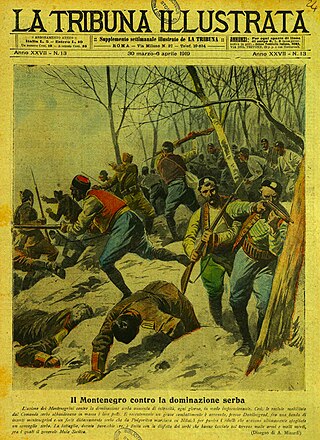
The Christmas Uprising, also known as the Christmas Rebellion, was a failed uprising in Montenegro led by the Greens in early January 1919. The military leader of the uprising was Krsto Popović and its political leader was Jovan Plamenac.

Yugoslav Railways, with standard acronym JŽ, was the state railway company of Yugoslavia, operational from the 1920s to the 1990s, with its final incarnation transferring to Serbia, the successor of JZ is the joint stock company of the Serbian Railways in 2006.
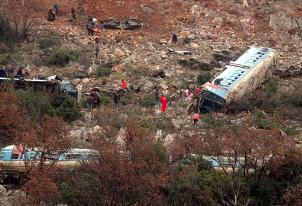
The Bioče derailment was a train crash on January 23, 2006 in Montenegro. At least 45 people, including five children, were killed and another 184 injured. It was the worst train disaster in Montenegrin history.
Bioče is a village nine miles northeast of Podgorica, Montenegro. It is situated on the main road connecting Podgorica with northern Montenegro and with Serbia (E65/E80) routes and is a local station on Belgrade–Bar railway.

Podgorica Airport is an international airport serving the Montenegrin capital of Podgorica and the surrounding region. It is one of two international airports in Montenegro, the other being Tivat Airport. Both are operated by the state-owned company Airports of Montenegro.
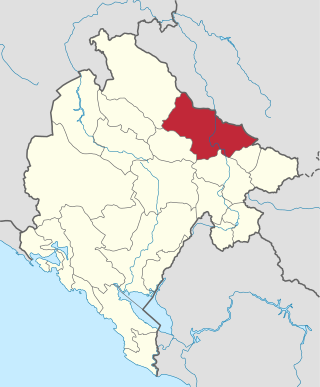
Bijelo Polje Municipality is one of the municipalities of Montenegro, and is located in northeastern Montenegro, in the Lim river valley, being part of Raška region. Its administrative centre is town of Bijelo Polje. It covers an area of 924 km2, and had a population of 46,051 at the 2011 census.

Podgorica Capital City is one of the territorial subdivisions of Montenegro. The seat of municipality is the city of Podgorica. Podgorica municipality covers 10.4% of Montenegro's territory and is home to 29.9% of the country's population. It is the nation's administrative centre and its economic and educational focus.

Golubovci is a small town in the Podgorica Municipality of Montenegro.

The Belgrade–Bar railway is a railway connecting the Serbian capital of Belgrade with the town of Bar, a major seaport in Montenegro.
Sport in Montenegro revolves mostly around team sports, such as football, basketball, handball, and volleyball. Other sports involved are boxing, tennis, swimming, judo, karate, athletics, table tennis, and chess.

Rail transport in Montenegro is operated by four separate companies, which independently handle railway infrastructure, passenger transport, cargo transport and maintenance of the rolling stock. The four companies were a part of public company Railways of Montenegro until it was split up in 2008.

The Podgorica Railway Station is a railway station located in Podgorica, Montenegro.
The Podgorica–Shkodër railway is a railway connecting Albania and Montenegro, used for freight-purposes only. It is Albania's only international rail link. Although initially built between 1984 and 1985, it fell into disuse in 1991 and later fully reopened in 2003.
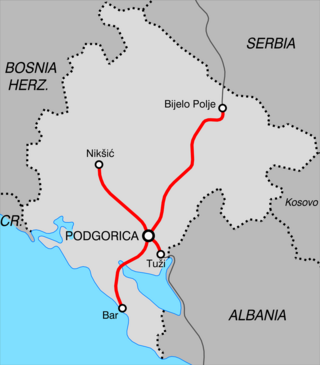
The Nikšić–Podgorica railway is a railway connecting Montenegro's capital Podgorica and the country's second largest city, Nikšić. The line connects to the Belgrade–Bar railway and the Podgorica–Shkodër railway at Podgorica. It is operated by ŽICG.
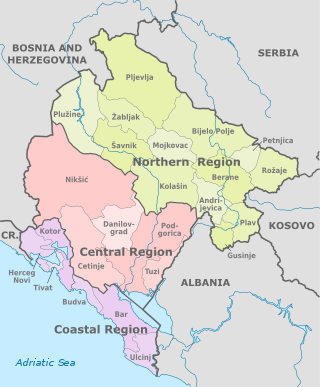
Statistical regions of Montenegro are defined, as of 2011, by the Montenegrin Regional Development Law. The regions, as defined by law, roughly correspond to the informal and colloquial division of Montenegro, often used by the Montenegrin media and citizens.
The Zagreb–Rijeka railway, officially designated as the M202 railway, is a 229-kilometre (142 mi) long railway line in Croatia connecting Zagreb and Rijeka. It is part of the Pan-European corridor V branch B, which runs from Rijeka to Budapest. It is electrified and single-tracked.